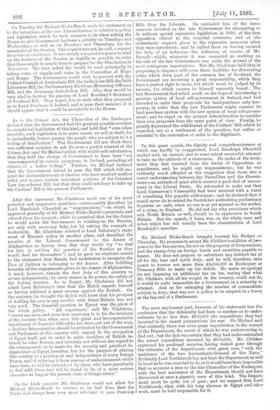On the Irish question Mr. Gladstone would not allow Sir
Michael Hicks-Beach to assume, as he had doue, that the Tories had always been even more reluctant to pass Coercion Bills than the Liberals. He reminded him of the fierce censures lavished on the late Government for attempting to do without special repressive legislation in 1880, of the firm opposition offered to the remedial measures, and of the enthusiastic support given to the repressive measures when they were introduced ; and he rallied them on having secured the help of an influence—the influence, of course, of Mr. Parnell—which, whenever it was suspected as working on the side of the late Government, was made the ground of the most outrageous imputations. But Mr. Gladstone held that in proposing to dispense with even those facilities for discovering crime which form part of the common law of Scotland, the Government are incurring a great responsibility, which they have a perfect right to incur, but which must be judged by its success, for which success he himself earnestly hoped. The late Government had relied much on the hope of introducing a genuine system of local self-government in Ireland, and had intended to make their proposals for land-purchase only tem- porary, in order that the new Parliament might connect its /and-purchase system with the new system of local self-govern- ment; and he urged on the present Administration to consider their own proposals from the same point of view. Finally, he greatly deprecated the withdrawal of the Crofters' Bill, which he regarded, not as a. settlement of the question, but rather as essential to the restoration of order in the Highlands.


































 Previous page
Previous page